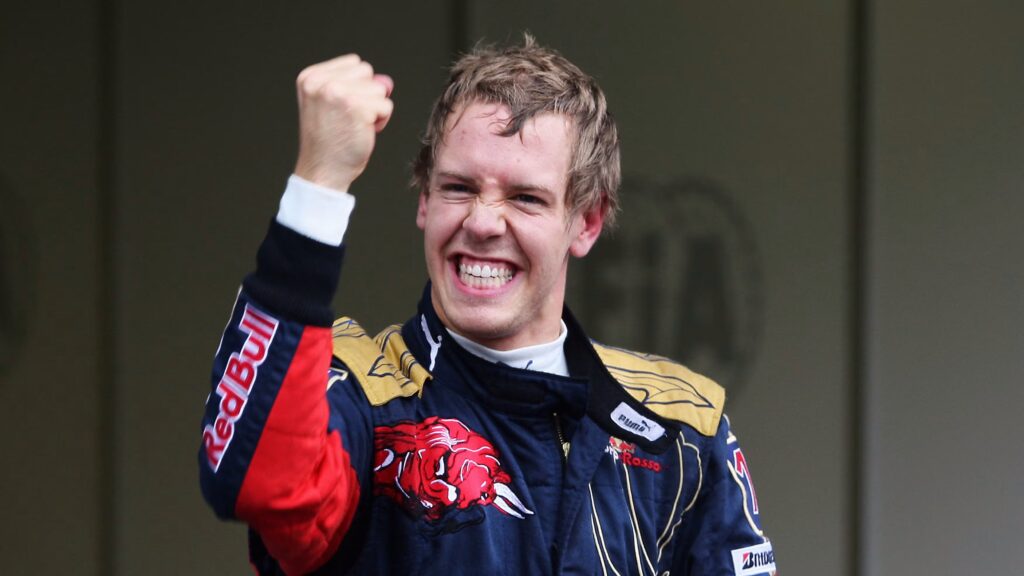
Change is in the air at Red Bull Racing, and not just with the drivers on the track. As the team faces a period of unprecedented transition, two names are emerging as pivotal to shaping its next era: Sebastian Vettel and Liam Lawson. Though their stories at Red Bull are very different, together they reflect a growing realization that the team’s future may depend as much on leadership off the track as performance on it.
Why Vettel Makes Sense as Red Bull’s Next Driver Development Leader
With Helmut Marko’s long-standing reign over Red Bull’s young driver program likely entering its final chapters, the team faces a critical decision about its next evolution. A natural, and highly compelling, candidate is Sebastian Vettel.
Vettel isn’t just a Red Bull success story; he’s the embodiment of what the program once aspired to create. Four world championships, a relentless drive to win, and a sharp mind for the broader demands of modern Formula 1. As Red Bull looks to adapt to a sport increasingly shaped by long-term thinking, leadership maturity, and driver wellbeing, Vettel could bring a softer but still highly competitive edge to the team’s junior ranks.
There’s a strong case that Vettel would maintain Red Bull’s hallmark intensity, but add the empathy and strategic patience that many feel the program has lacked. Over the years, Red Bull has been criticized for treating young talents like disposable assets: rapidly promoting, then discarding them when instant results didn’t materialize. Vettel’s leadership could recalibrate that approach, still pushing drivers to excel but doing so within a healthier and more sustainable framework.
In short, Red Bull doesn’t need to lose its identity, but evolving it through someone like Vettel could allow it to retain its aggressive edge while modernizing how it cultivates champions.
Given Vettel’s excellent relationship with senior Red Bull leadership and his stated interest in staying involved with motorsport in a meaningful way, this move would hardly feel forced. It would be an evolution that ties Red Bull’s most successful past to its most ambitious future.
Lawson: Proof That Red Bull’s Pressure Cooker Still Works, At a Cost
If Red Bull needed evidence of how its brutal system still forges elite drivers, they don’t need to look further than Liam Lawson.
After stepping into the spotlight with AlphaTauri in 2023, under incredibly high-pressure circumstances, Lawson emerged visibly transformed. His substitute performances didn’t just show technical skill; they revealed a new mental toughness, a sharper sense of urgency, and a clear understanding of what survival in Red Bull’s world demands.
Lawson today carries himself like someone who knows exactly how fragile opportunities in F1 can be. After being demoted from Red Bull Racing back to Racing Bulls, his demeanor is calmer but more intense, his public statements more measured. It’s clear the Red Bull system didn’t just test him; it hardened him. He now understands that Formula 1, and especially Red Bull, rewards not just talent but resilience, political acumen, and a refusal to blink under pressure.
That evolution speaks volumes about both the effectiveness and the danger of Red Bull’s current structure. Drivers either break or ascend, there is very little middle ground. Lawson’s experience illustrates that the system can still produce exceptional results, but it also highlights why a rethink under someone like Vettel could make the program even stronger: refining talent without unnecessarily burning it out.
Red Bull’s Youth Renaissance: Balancing Brutality with Sustainability
When viewed together, the emerging Vettel discussions and Lawson’s personal growth from his low point of demotion point to the same conclusion: Red Bull’s path forward lies not in abandoning its core philosophy, but in modernizing it.
For decades, Red Bull’s approach was simple: find raw speed, sharpen it fast, and discard anything that couldn’t keep pace. It worked. But the next era of Formula 1 will demand not just winners, but winners who can endure, adapt, and lead in a complex, fast-changing environment. Vettel, with his blend of fierce competitiveness and growing off-track sophistication, could be the perfect architect of that shift.
Lawson’s transformation shows that Red Bull’s pressure cooker still produces the kind of hardened talents needed to win. But to future-proof the dynasty, Red Bull must ensure it’s not just building survivors, but building champions who can thrive long-term. In that light, Vettel’s return would be more than just symbolic, it would be strategic.
The future of Red Bull Racing may well depend on getting this next evolution right. And if they do, it could set the stage for another generation of dominance, one even more formidable than the last.
